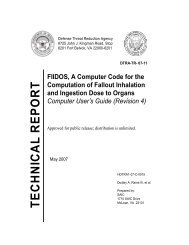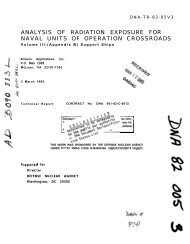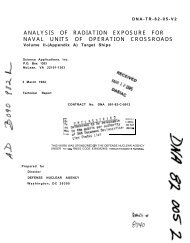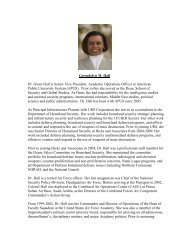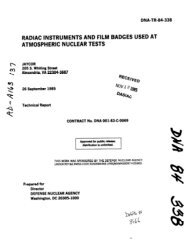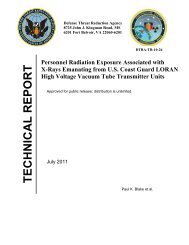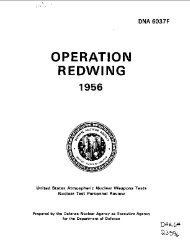Shield - Defense Threat Reduction Agency
Shield - Defense Threat Reduction Agency
Shield - Defense Threat Reduction Agency
Create successful ePaper yourself
Turn your PDF publications into a flip-book with our unique Google optimized e-Paper software.
On April 6, 199 , an aircraft carrying the presidents of Rwanda<br />
and Burundi was struck in mid-air by two man-portable air-defense<br />
missiles, causing the plane to erupt into flames and crash into the<br />
gardens of the Rwandan presidential palace.<br />
The crash killed both presidents and set into motion some of<br />
the bloodiest conflicts of the late 20th century, including a Rwandan<br />
genocide that killed more than 800,000 people. Responsibility for<br />
the attack remains disputed, but its method – man portable air-defense<br />
systems (MANPADS), commonly referred to as shoulder-fired<br />
anti-aircraft missiles – demonstrates the tragic and destabilizing<br />
consequences that can occur when conventional weapons and munitions<br />
fall into dangerous hands.<br />
During the Cold War millions of small arms and light weapons<br />
(SALW) – pistols, machine guns, shoulder-launched anti-aircraft<br />
missiles and rocket-propelled grenades – were manufactured and<br />
shipped around the world. Since then, many of these weapons have<br />
fueled local and international armed conflicts and supplied low-level<br />
terrorists and non-state actors with the ability to cause widespread<br />
casualties and economic disaster.<br />
The United Nations estimates that over 500,000 people are killed<br />
every year by conventional firearms alone around the globe, with<br />
the bulk of these deaths occurring in conflict zones in developing<br />
regions. Additionally, at least 40 civilian aircraft have been hit by<br />
MANPADS since the 1970s and these weapons continue to pose a<br />
potential threat to commercial aviation. Landmines are a prevalent<br />
threat in many areas of the world and it is estimated that there are<br />
still hundreds of thousands of landmines that remain undetected.<br />
The Small Arms Light Weapons Branch plays a critical role in the<br />
effort to reduce SALW proliferation across the globe. The branch assists<br />
foreign governments with improving security, safety and management<br />
of state-controlled stockpiles of SALW, MANPADS, and<br />
conventional ammunition. SALW experts provide foreign governments<br />
with assessments and technical advice, as well as orientation<br />
seminars on international best practices for physical security and<br />
stockpile management (PSSM). By securing and managing these<br />
stockpiles, the DTRA SALW Branch is diminishing the availability<br />
of weapons and ammunition to terrorists and insurgents. They<br />
are helping to reduce regional exposure to destabilizing cross-border<br />
weapons transfers, and minimizing the risk of catastrophic accidents<br />
across the globe.<br />
“The whole world is affected by the proliferation of small arms and<br />
light weapons. If it’s not a concern for tracking and tracing, it’s a<br />
concern for import and export control or it’s a concern for illegal<br />
trafficking,” says SALW Branch Chief Larry Schultz. “The channels<br />
used to smuggle drugs and other illegal substances are the same<br />
channels used to smuggle weapons and ammunition.”<br />
/ the shield / fall 2011<br />
DTRA’s On-site Inspection Directorate first became involved in<br />
physical security and stockpile management in 2000, following a<br />
deadly ammunition explosion in Guyana. Prior to that accident, the<br />
agency’s focus centered primarily on arms-control treaties and activities<br />
in the former Soviet Union. But after the Guyana event, DTRA<br />
was asked to provide technical expertise to the U.S. Department of<br />
State to help foreign nations in safely securing and storing stockpiles<br />
of arms, ammunitions and explosives. DTRA got the job, largely<br />
because of the agency’s expertise in conducting military missions in<br />
sensitive environments.<br />
Over the following years, DTRA developed and conducted orientation<br />
seminars to assist nations with securing their national SALW<br />
and ammunition holdings. In 2006, the agency was designated as<br />
the executive agent for supporting SALW destruction initiatives and<br />
for providing assistance to countries wishing to improve the security<br />
of, or reduce the size of, their stockpiles of small arms and ammunition.<br />
Since that time, the agency’s SALW expertise has continued to<br />
grow significantly as the types and numbers of missions have developed<br />
and evolved.<br />
Today, program requests come from a number of sources – U.S.<br />
Embassies, U.S. regional combatant commands (European Command,<br />
Central Command, Northern Command, Africa Command,<br />
Southern Command and Pacific Command), the Department of<br />
State, host nations, and multilateral organizations. For each request,<br />
DTRA conducts a thorough, routine coordination process which<br />
seeks concurrence from the office of the secretary of defense, joint<br />
staff, appropriate staff offices, and the partner country’s U.S. Embassy.<br />
Through additional coordination with the United Nations, NATO,<br />
the Multinational Small Arms and Ammunition Group, the Organization<br />
for Security and Cooperation in Europe, and other likeminded<br />
nations’ arms control and verification agencies, the program<br />
has facilitated the execution of many U.S. bilateral and multilateral<br />
commitments.<br />
In less than a decade, DTRA has conducted PSSM assessment missions<br />
and seminars in 60 countries worldwide.<br />
Funding for DTRA-recommended solutions – ranging from the destruction<br />
of conventional weapons to the building of more secure<br />
SALW storage facilities – may be provided by the Office of Weapons<br />
(right) SALW Technical Advisor Ben Cacioppo escorts U.s. sen. richard lugar and U.s.<br />
officials at storage facility in Burundi – 2010.



